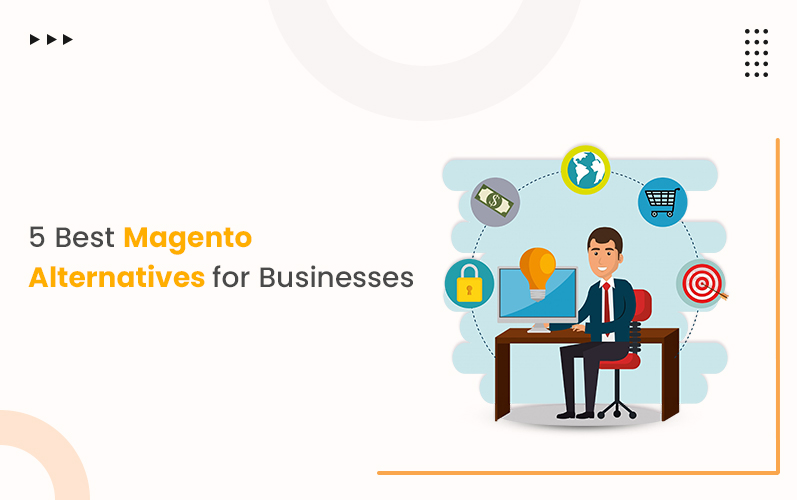Magento has shown a steep decrease in e-commerce usage in the last ten decades. Reports show its market share has dropped by more than 50% since 2018, and due to that, Magento alternatives have become a hot topic. Though once Magento ruled this e-commerce domain with vigorous customizable features and was widely popular for its open-source version among smaller businesses. But due to its steep learning curve, high costs, and complex maintenance, merchants started exploring some other simpler, more scalable Magento alternatives that deliver speed, flexibility, and reduced operational burdens.
Key Takeaways:
- Discover top Magento alternatives tailored for modern e-commerce needs.
- Compare SaaS platforms with customizable open-source solutions.
- Evaluate costs, scalability, and technical demands before migrating.
- Review the features, benefits, and drawbacks of each alternative.
- Leverage expert guidance for smooth Magento migration services.
Key Factors to Consider Before Choosing a Magento Alternative
When exploring Magento migration options, businesses should carefully evaluate the following factors that guarantee long-term success:
- Pricing Structure: Understand whether the platform offers open-source flexibility or subscription-based plans that fit your budget.
- Ease of Use: Check it thoroughly before investing in other alternatives so that your non-technical team can manage the store without constant developer assistance.
- Scalability: Verify the platform can support the growth of your store, especially when sales, products, and traffic increase.
- Integration Capabilities: Check compatibility with vital third-party tools such as CRM, ERP, and payment gateways.
- Support & Community: Look for strong technical support and an active user community for ongoing guidance.
- Marketing Tools: Consider built-in features for SEO, promotions, and customer engagement to drive sales.
The Best Magento Alternatives for Scalable & Modern Ecommerce Growth
WooCommerce: WordPress-Powered Ecommerce
WooCommerce, a leading WordPress plugin, is a favorite within the WordPress community for building online stores. Its simple setup makes it well-suited for small- to medium-sized businesses. Even users with limited technical knowledge can install and configure WooCommerce with ease. Brands that are looking for better Magento migration services should try WooCommerce once. This is one of the most flexible, open-source options that are built with WordPress’s strengths.
Key Features:
- One-click refund management for customer convenience.
- Advanced blogging capabilities powered by WordPress.
- Vast plugin marketplace offering limitless flexibility.
Key Benefits:
- Intuitive interface familiar to WordPress users.
- Multi-channel sales through Amazon, eBay, and Walmart integrations.
- Contains powerful features of WordPress and blogging tools.
Major Drawbacks:
- Exclusively compatible with WordPress websites.
- Plugin conflicts can arise due to varied global developers.
- Scaling for larger e-commerce operations often requires complex, advanced plugins.
OpenCart: Lightweight & Flexible Ecommerce
OpenCart delivers flexible store design options with a clean, modern dashboard that is easy to navigate. It offers numerous pre-designed themes and simplifies the setup process during Magento migration. Core features include multilingual and multi-currency support, product ratings, downloadable items, recurring billing, and guest checkout. All these advantages make it a practical choice for businesses wanting a straightforward yet versatile e-commerce platform.
Key Features:
- Support for multiple currencies like USD, GBP, Euro, and so on, and also provide multiple language support.
- Provides customer reviews and product ratings.
- Downloadable products and recurring payments.
- Guest checkout for faster purchases.
- Extensive marketplace for themes and extensions.
Key Benefits:
- Lightweight platform ensuring fast performance.
- Smooth transition from Magento, as both have PHP foundations.
- Access to 13,000+ extensions and 2,700+ design templates.
Major Drawbacks:
- Occasional irregular updates and a slower checkout process.
- Limited SEO features and marketing attributes.
- Extra costs for hosting, domains, and dedicated support services.
Shopify: A Leading SaaS Solution
Shopify stands out as one of the most widely used SaaS e-commerce platforms, offering over 60,000 online stores and a vast collection of free and premium themes. It provides businesses with essential e-commerce functionalities across different subscription tiers. Merchants can easily manage orders, payments, inventory, shipping, and access in-depth store analytics through an intuitive dashboard. Shopify is considered one of the top Adobe Commerce competitors for businesses seeking simplicity and scalability.
Key Features:
- Recover abandoned carts to regain lost revenue.
- Multi-channel selling across social media platforms and Amazon.
- Shipping integrations with USPS, DHL Express, UPS, and Canada Post.
- Manage product variants and organize categories effectively.
- Support more than 100 payment gateways, including Shopify payments.
- Capability to sell digital products and services.
Key Benefits:
- Provides a complete subscription, which includes hosting, SSL, and domain.
- Provides unlimited bandwidth and storage for large product catalogs.
- Advanced analytics and reporting for sales and customer insights.
- Point-of-sale functionality and automatic tax calculation.
- Built-in fraud protection for secure transactions.
Major Drawbacks:
Customization is limited compared to open-source platforms.
High monthly subscription fees, mainly for third-party app dependency and transaction charges, are also added with it when business grows.
BigCommerce: A Flexible Open-SaaS Platform
BigCommerce provides businesses with powerful e-commerce solutions, attractive templates, and reliable uptime, operating as an Open-SaaS platform with monthly subscription fees. It enables merchants to manage stores efficiently while supporting multiple product types. It is considered a strong Magento alternative, as it comes with extensive integrated features without heavily depending on third-party applications. BigCommerce is ideal for companies seeking high flexibility and multi-channel selling.
Key Features:
- Sell physical, digital, and service products natively.
- No transaction fees are required.
- Supports over 100 currencies and 65+ payment gateways.
- The BigCommerce Shipping app provides discounts up to 80% for USPS, DHL, and FedEx.
- Recover abandoned carts to regain lost sales.
- Access 600+ apps for additional functionality.
- Multi-channel selling across social media, Amazon, eBay, and more.
Key Benefits:
- Multi-currency management.
- Real-time shipping calculations from third-party carriers.
- All-inclusive reporting and analytics.
- Integral product reviews and SEO tools.
- Drag-and-drop page builder for easy customization.
- GDPR compliance tools and abandoned cart recovery.
- 15-day free trial to explore the platform.
Major Drawbacks:
- Limited flexibility with free themes and some customization challenges.
- Annual sales caps may require upgrading to higher-tier plans.
- The interface can be complex for beginners, requiring a learning curve.
Medusa: The Developers' Favorite Alternative
Medusa Ecommerce is an open-source, headless commerce engine built on Medusa.js, created to offer brands and developers unmatched flexibility. It stands out as a modern alternative to legacy platforms like Shopify and Magento. Using this e-commerce alternative, businesses build highly customizable storefronts without sacrificing speed or scalability. Medusa proves to be an agile option for organizations undergoing Magento migration services.
Key Features:
- Open-source framework encouraging innovation and community-driven growth.
- Headless architecture that separates backend and frontend for full creative control.
- Custom APIs and workflows for personalized customer experiences.
- Integrated support for returns, swaps, claims, and advanced customer management.
- Smooth integration with CRMs, ERPs, payment gateways, and third-party tools.
- Omnichannel capabilities across web, mobile, POS, and marketplaces.
Key Benefits:
- Ultra-fast page loading with intuitive navigation.
- High level of personalization with tailored product recommendations.
- Flexible checkout supporting Stripe, PayPal, Klarna, and more.
- Provide scalable solutions that grow with your business needs.
- A developer-first approach guarantees agility and future-proofing.
Major Drawbacks:
- Requires developer involvement for setups (not plug-and-play).
- Fewer pre-built templates compared to older platforms.
How does The Tech Clouds (TTC) help in Magento migration services?
A reliable Magento development company like The Tech Clouds (TTC) can simplify complex migration processes by ensuring data security, smooth functionality, and minimal downtime during transitions. With years of expertise, TTC provides tailored Magento migration services that cover product catalogs, customer data, and integrations without disrupting business operations. Beyond Magento, our team also specializes in Medusa development, offering flexible, headless e-commerce solutions for modern businesses. By combining technical expertise with innovative approaches, TTC guarantees that businesses not only migrate smoothly but also gain a scalable, future-ready e-commerce platform to support long-term growth.



